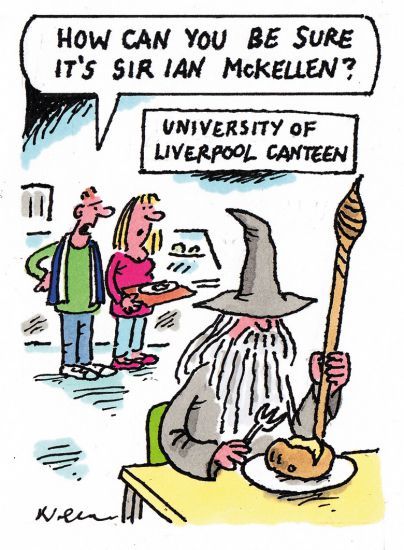
Robert Kelly, professor of political science at Pusan National University, was making sage points about the impeachment of South Korea’s president during a live interview from his home on BBC television on 10 March. Viewers then saw a toddler walk in behind him and start doing a silly dance. As he fended off the youngster and tried to carry on with the interview, a baby in a walker entered the room, followed by Professor Kelly’s wife, who skidded in at high velocity to retrieve the children and exit. After much amusement on social media, the incident made headlines around the world. Professor Kelly’s gravitas turned to bathos and no one was paying the slightest attention to his expertise on South Korean politics, but he undoubtedly has a fun household.
King’s College, Cambridge has “provoked a backlash from students” after fears that Canada geese living in its grounds might be culled “because their excrement has become a safety hazard”, The Daily Telegraph reported on 7 March. “From a moral standpoint, we believe that geese have intrinsic value and therefore deserve a life free from suffering and human exploitation,” students wrote in a letter to King’s management. A King’s spokesman said that there had been complaints that the geese “are causing the paths at the college to become slippery and unattractive”, but that it would continue to use non-harmful measures. It is customary to see certain UK newspapers seize on any Oxbridge story, but goose excrement may be a new frontier.
One attendee described a speech on LGBT issues given by Sir Ian McKellen at the University of Liverpool as “one of the most incredible talks” he had ever experienced. But for some students, another part of his visit was apparently more memorable, The Liverpool Echo reported on 8 March: the moment when the actor sat down afterwards in the Guild of Students to eat alongside undergraduates. Within days, a surprisingly realistic “blue plaque” had appeared on the table commemorating how the thespian had “sat here…and enjoyed a jacket potato and a latte”. Could this be the attraction that, at last, persuades tourists that a trip to Liverpool isn’t just about the Beatles?
Facebook founder and CEO Mark Zuckerberg is to get a degree at last, CNBC reported on 7 March. The entrepreneur has been named this year’s commencement speaker at Harvard University, a role that usually comes with the award of an honorary degree, 13 years after he left for Silicon Valley without graduating. As the world’s fifth richest person, and as one of the globe’s most significant philanthropists, Mr Zuckerberg certainly seems to be a strong candidate for such an award. But any hopes that this honorary degree will be enough to stop Mr Zuckerberg being constantly wheeled out as an example of why universities are allegedly obsolete in the modern economy are likely to be misplaced, sadly.
It has been one of the most hotly contested prizes in higher education: the chance to enrol Malala Yousafzai, the schoolgirl activist who survived an attempted murder by a Taliban gunman. And the University of Oxford appears to have won out, with The Daily Telegraph reporting on 11 March that the Nobel Peace prizewinner had received an offer to study philosophy, politics and economics at the institution, conditional on her achieving three A grades at A level. Ms Yousafzai had previously expressed an interest in studying at Stanford University, so this would represent a victory for Oxford over its US rivals. And, with Oxford’s PPE course having educated what sometimes feels like half the UK’s political elite, is the sky the limit for this inspiring 19-year-old?
Ms Yousafzai presumably had to go through the notorious University of Oxford admissions interview, but prospective students north of the border have been facing a very different sort of test, the BBC reported on 13 March. Academics interviewing applicants for Edinburgh Napier University’s veterinary nursing programme were joined by a family of fox red Labradors, which were used to assess hopefuls’ ability to communicate with animals, and to help create a “tension-free” atmosphere in the room. Cue lots of cute photos of dad Simba, mother Tia and puppy Fern, who obliged by wearing ties and donning staff badges. It’s a nice publicity stunt for the university – and, with three years having passed since the story last did the rounds, the communications office clearly thought that it was time to give an old trick some new dogs.
Register to continue
Why register?
- Registration is free and only takes a moment
- Once registered, you can read 3 articles a month
- Sign up for our newsletter
Subscribe
Or subscribe for unlimited access to:
- Unlimited access to news, views, insights & reviews
- Digital editions
- Digital access to THE’s university and college rankings analysis
Already registered or a current subscriber?